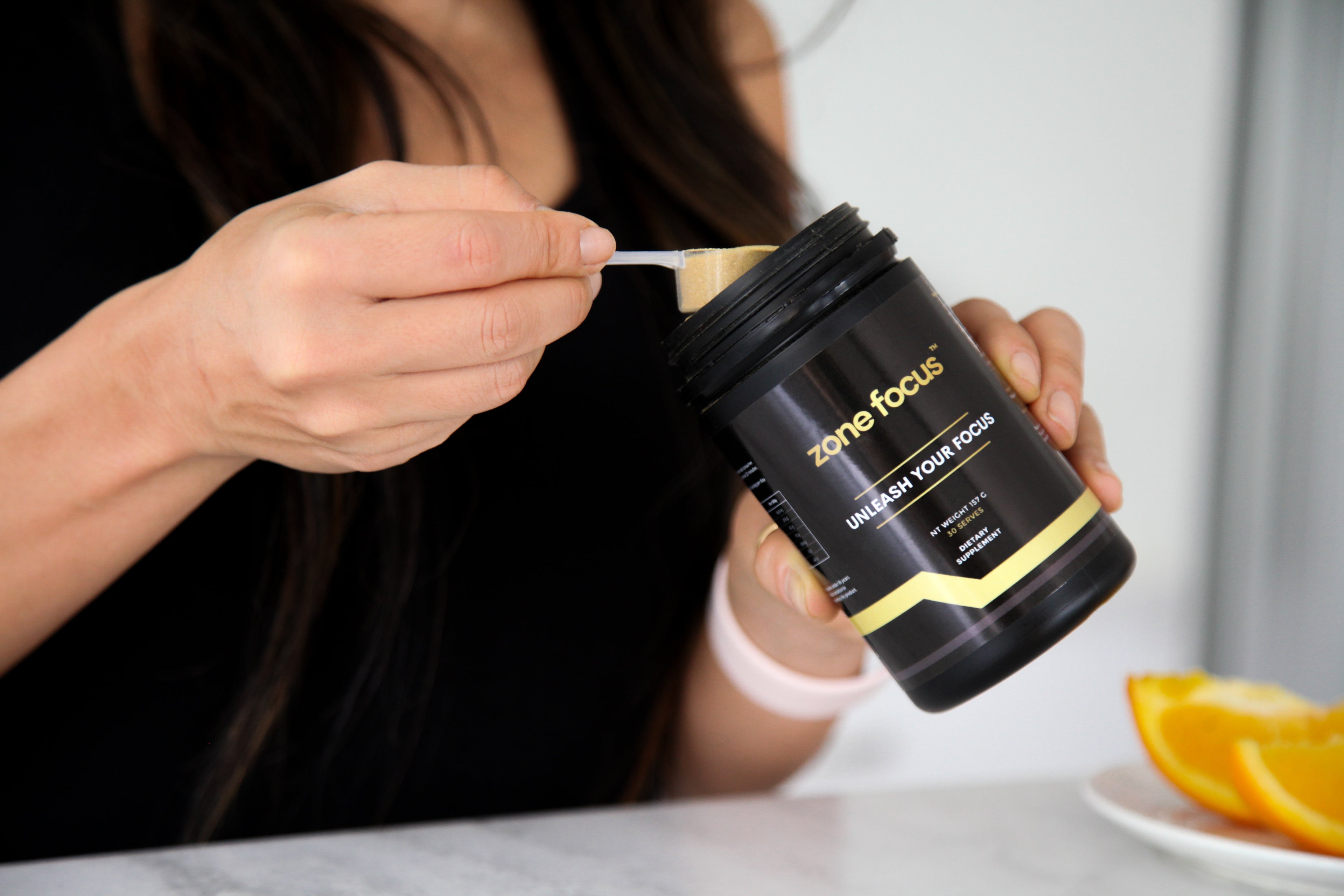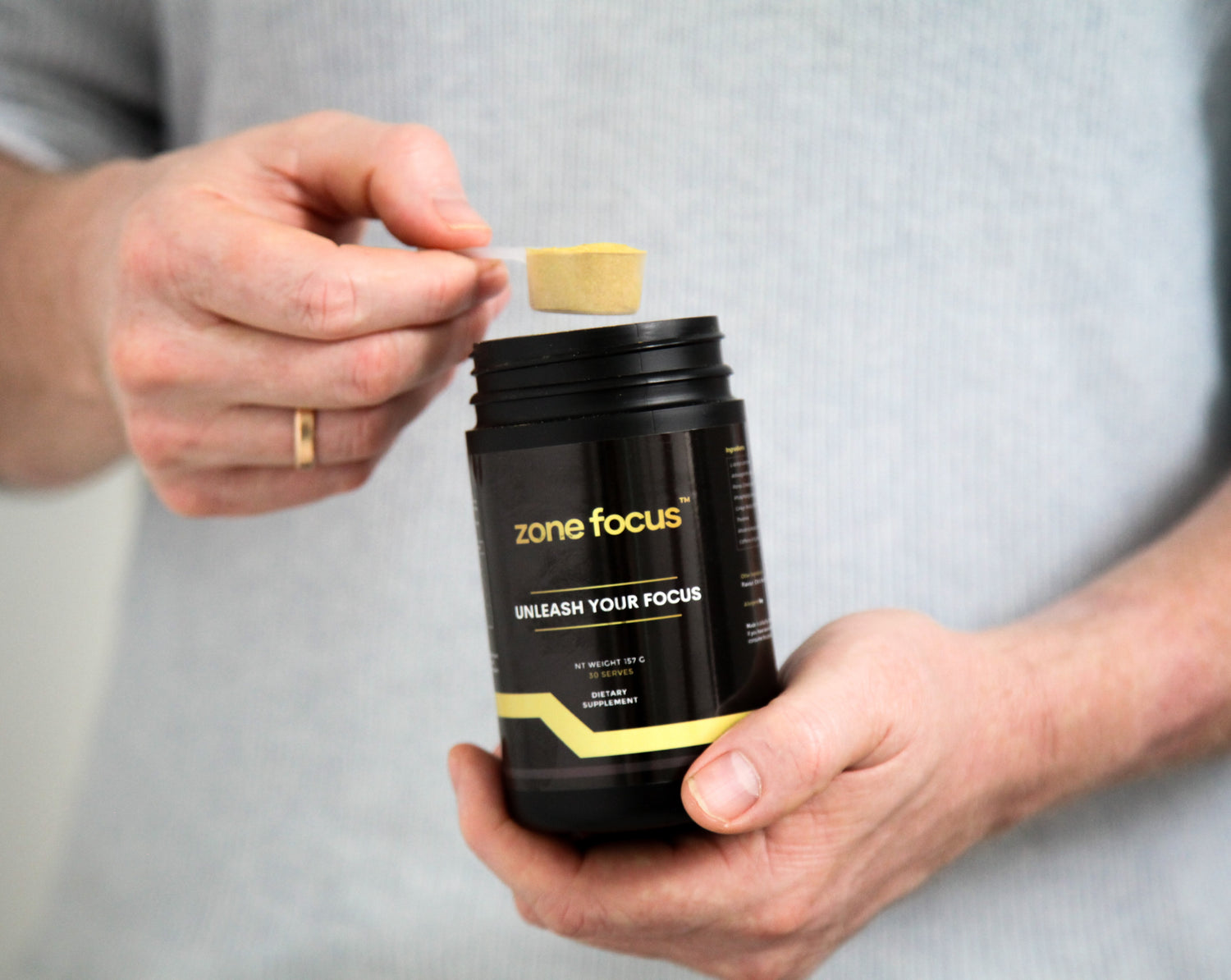
Ingredients & Science
Powerful Focus Formula.
Zone Focus combines the leading cognitive ingredients in dosages backed by the latest scientific literature. Ingredients that work synergistically, improve focus both instantly and over time.
Rhodiola Rosea is an adaptogenic herb known for its stress-reducing and mood-boosting effects. The active compounds, rosavins, and salidrosides, help the body adapt to physical and emotional stress, reducing fatigue and promoting a sense of calm. Rhodiola Rosea also enhances mental performance, improves focus and attention, and increases energy levels, making it a valuable ingredient for cognitive support.
Study one:
Rhodiola rosea in stress induced fatigue — A double blind cross-over study of a standardized extract SHR-5 with a repeated low-dose regimen on the mental performance of healthy physicians during night duty -ScienceDirect
Study two:
A double-blind, placebo-controlled pilot study of the stimulating and adaptogenic effect of Rhodiola rosea SHR-5 extract on the fatigue of students caused by stress during an examination period with a repeated low-dose regimen - ScienceDirect
Abstract Study one:
In otherwise healthy physicians, supplementation of rhodiola at 170mg (4.5mg salidroside) for 2 weeks (double blind crossover) was significantly antifatigue as assessed by a total fatigue index and was able to improve performance on work-related tasks by approximately 20%.
Abstract Study two:
20 days of rhodiola supplementation during examination periods for students (100mg SHR-5) was able to improve neuromotoric fitness (accuracy of maze drawing test), fatigue, and well being relative to placebo. Exam scores were 8.4% higher in the rhodiola group relative to placebo.
- 170mg ( 3% rosavin and 1% salidroside )
Theanine is an amino acid naturally found in green tea. It is known for its calming properties, promoting relaxation and reducing anxiety without causing drowsiness. Theanine also enhances cognitive function by improving focus, attention, and mental clarity. It works synergistically with caffeine to provide a balanced and sustained boost in energy, alertness, and productivity.
Caffeine is a natural stimulant that has been widely studied for its effects on alertness, focus, and cognitive performance. It acts by blocking adenosine receptors in the brain, leading to increased wakefulness and reduced perceived fatigue. Caffeine enhances mental alertness, improves reaction time, and may enhance cognitive functions such as memory and attention.
The latest scientific research indicates these 2 ingredients work synergistically together to improve cognitive performance.
Study one:
The combined effects of L-theanine and caffeine on cognitive performance and mood: Nutritional Neuroscience: Vol 11, No 4 (tandfonline.com)
Study two:
https://www.koreamed.org/SearchBasic.php?RID=0124KJN/2003.36.9.918&DT=1
Abstract Study one:
The aim of this study was to compare 50 mg caffeine, with and without 100 mg L-theanine, on cognition and mood in healthy volunteers. The effects of these treatments on word recognition, rapid visual information processing, critical flicker fusion threshold, attention switching and mood were compared to placebo in 27 participants. Performance was measured at baseline and again 60 min and 90 min after each treatment (separated by a 7-day washout). Caffeine improved subjective alertness at 60 min and accuracy on the attention-switching task at 90 min. The L-theanine and caffeine combination improved both speed and accuracy of performance of the attention-switching task at 60 min, and reduced susceptibility to distracting information in the memory task at both 60 min and 90 min. These results replicate previous evidence which suggests that L-theanine and caffeine in combination are beneficial for improving performance on cognitively demanding.
Abstract Study two:
The results of this study suggest that L-theanine containing tablets promote the release of alpha waves related to mental relaxation and concentration in young adult males.
- Theanine (200mg)
- Caffeine (100mg)
Ginkgo Biloba extract is derived from the leaves of the Ginkgo Biloba tree and contains a unique blend of flavonoids and terpenoids. These compounds possess antioxidant and anti-inflammatory properties, protecting brain cells from damage and improving blood circulation to the brain. Ginkgo Biloba supports memory, cognitive function, and concentration. It may also provide neuroprotective effects and support overall brain health.
Study one:
https://onlinelibrary.wiley.com/doi/epdf/10.1002/hup.352
Study two:
https://pubmed.ncbi.nlm.nih.gov/21802920/
Study Abstract one:
The most striking result, however, was a highly significant and sustained increase in the number of Serial Sevens responses following 320 mg of the Ginkgo–Ginseng combination at all post-treatment testing times.
Study Abstract two:
Results: After 6 weeks, EGb 761-treated subjects improved significantly in quantity of recall, i.e., the number of correctly recalled appointments (drug-placebo differences: p=0.038 for immediate and p=0.008 for delayed recall). Effects on qualitative recall performance (ratio of false to correct items) were similar (drug-placebo differences: p=0.092 for immediate and p=0.010 for delayed recall). No superiority of Ginkgo was evident in another everyday memory test which asked for recognition of a driving route (drug-placebo differences: p>0.10). The incidence of adverse events was low and not significantly different between treatment groups.
Discussion:
EGb 761 (240 mg once daily) improves free recall of appointments in middle-aged healthy volunteers, which requires high demands on self-initiated retrieval of learned material. This function is known to be sensitive to normal aging, i.e., reduced in healthy middle-aged subjects. No effects are seen in a less demanding everyday memory task which does not tap this critical function. This ties in with previous studies which found specific patterns of benefit from EGb 761 in demanding cognitive tasks.
- 240mg
L-acetyl-carnitine is an amino acid derivative that plays a crucial role in energy metabolism within the body. It helps transport fatty acids into the mitochondria, where they are converted into energy. L-acetyl-carnitine supports brain function by providing a source of energy for brain cells. It may enhance mental clarity, improve focus, and support cognitive performance.
Study one:
https://pubmed.ncbi.nlm.nih.gov/18065594/
Abstract Study one:
At the end of the study period, the levocarnitine-treated centenarians, compared with the placebo group, showed significant improvements in the following markers: total fat mass (-1.80 compared with 0.6 kg; P < 0.01), total muscle mass (3.80 compared with 0.8 kg; P < 0.01), plasma concentrations of total carnitine (12.60 compared with -1.70 mumol; P < 0.05), plasma long-chain acylcarnitine (1.50 compared with -0.1 micromol; P < 0.001), and plasma short-chain acylcarnitine (6.0 compared with -1.50 micromol; P < 0.001). Significant differences were also found in physical fatigue (-4.10 compared with -1.10; P < 0.01), mental fatigue (-2.70 compared with 0.30; P < 0.001), fatigue severity (-23.60 compared with 1.90; P < 0.001), and MMSE (4.1 compared with 0.6; P < 0.001).
Conclusions:
Our study indicates that oral administration of levocarnitine produces a reduction of total fat mass, increases total muscular mass, and facilitates an increased capacity for physical and cognitive activity by reducing fatigue and improving cognitive functions.
- 2000mg
Phosphatidylserine is a phospholipid that is naturally found in high concentrations in brain cell membranes. It plays a vital role in maintaining the integrity and fluidity of these membranes, supporting proper communication between brain cells. Phosphatidylserine supplementation has been associated with improved memory, enhanced cognitive function, and attention span. It may also support mood balance and promote overall brain health.
Abstract Study one:
PS supplementation significantly increased cognitive function prior to exercise. Improved cognitive function could benefit athletes and non-athletes alike. PS did not appear to affect mood or endocrine response prior to or following resistance exercise.
- 400mg
Panax Ginseng is a renowned adaptogenic herb known for its wide range of health benefits. The active compounds, triterpenoid glycosides, help the body adapt to stress, increase energy levels, and enhance mental performance. Panax Ginseng promotes cognitive function, improves focus, and supports memory. It is also associated with improved mood, reduced fatigue, and overall well-being.
Study one:
https://pubmed.ncbi.nlm.nih.gov/3528672/
Study two:
https://pubmed.ncbi.nlm.nih.gov/23717092/
Abstract study one:
Various tests of psychomotor performance were carried out in a group of 16 healthy male volunteers given a standardized preparation of Korean ginseng (G 115; 100 mg twice a day for 12 weeks) and in a similar group given identical placebo capsules under double-blind conditions. A favourable effect of G 115 relative to baseline performance was observed in attention (cancellation test), processing (mental arithmetic, logical deduction), integrated sensory-motor function (choice reaction time) and auditory reaction time. However, end performance of the G 115 group was superior statistically to the placebo group only in mental arithmetic. No difference between G 115 and placebo was found in tests of pure motor function (tapping test), recognition (digit symbol substitution) and visual reaction time. No adverse effects were reported. It is concluded that G 115 may be superior to placebo in improving certain psychomotor functions in healthy subjects.
Abstract study two:
A 24-week randomized open-label study with Korean red ginseng (KRG) showed cognitive benefits in patients with Alzheimer's disease. To further determine long-term effect of KRG, the subjects were recruited to be followed up to 2 yr. Cognitive function was evaluated every 12 wk using the Alzheimer's Disease Assessment Scale (ADAS) and the Korean version of the Mini Mental Status Examination (K-MMSE) with the maintaining dose of 4.5 g or 9.0 g KRG per d. At 24 wk, there had been a significant improvement in KRG-treated groups. In the long-term evaluation of the efficacy of KRG after 24 wk, the improved MMSE score remained without significant decline at the 48th and 96th wk. ADAS-cog showed similar findings. Maximum improvement was found around week 24. In conclusion, the effect of KRG on cognitive functions was sustained for 2 yr follow-up, indicating feasible efficacies of long-term follow-up for Alzheimer's disease.
- 400mg
Ashwagandha is an adaptogenic herb that has been used for centuries in traditional Ayurvedic medicine. Its active compounds, including with anolides, help the body adapt to stress and promote a balanced mood. Ashwagandha supports cognitive function by reducing anxiety and improving focus and mental clarity. It may also enhance memory, boost energy levels, and support overall well-being.
Abstract Study one:
These results suggest that Withania somnifera extract can improve cognitive and psychomotor performance and may, therefore, be a valuable adjunct in the treatment of diseases associated with cognitive impairment.
- 600mg

